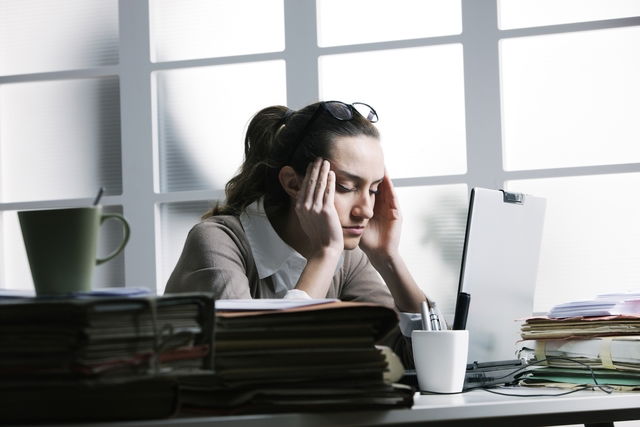Symptoms of stress can present physically or psychologically, and may vary from person to person. The most common symptoms of stress include hair loss, impatience, dizziness, difficulty sleeping, muscle tension and headaches.
These symptoms can present in anybody, at any age. Although symptoms of stress are most commonly observed in adults, they can also emerge in children and teens undergoing problems at school, bullying and family troubles at home.
Stress is linked to high cortisol levels in the blood, which can lead to stress-related illnesses and muscle tension.

What are the most common symptoms of stress?
As mentioned, symptoms of stress can present psychologically or physically. The main symptoms people undergoing stress will have are:
1. Psychological symptoms
Stress can lead to the development of notable psychological symptoms such as:
- Anxiety, distress, nervousness, and excessive worrying
- Irritation and impatience
- Dizziness
- Concentration and memory problems
- Feeling a loss of control
- Difficulty sleeping
- Difficulty making decisions
In addition, people who are stressed may be unable to concentrate on usually easy activities, which can cause even more stress.
2. Physical symptoms
Stress can also present with physical symptoms, such as:
- Hair loss
- Headaches
- Muscle tensions
- Allergies
- Reduced immunity (and frequent illnesses)
- Gastrointestinal changes
- Heart problems (like increased heart rate)
- Cold and sweat hands
- Skin problems (like acne)
If you notice these symptoms and are unsure why they are appearing, you should see a doctor or a psychologist for assessment and possible treatment.
How to manage stress and anxiety
Mild stress can be managed with soothing teas made with naturally relaxing herbs like chamomile, linden and valerian. Learn more about herbs for anxiety and stress that you can use to prepare soothing teas at home.
Another tip for managing stress and anxiety is avoiding over-exposure to social media. Some of the content posted can cause sadness, loneliness and a feeling of inadequacy.
Learning how to avoid or cope with stress is very important for recovery and for reducing symptoms. You may benefit from seeking a psychological consult, as a psychologist can help you to cope with stress using methods that are realistic for you.
Another great way to manage stress is to exercise regularly by running, participating in martial arts and dancing. These can help to distract your mind and release endorphins into the bloodstream, which can boost your wellbeing.
